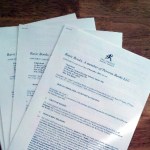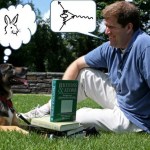Book Writing
The book-in-progress (which is coming along, albeit slowly, thanks for asking) is built around making analogies between scientific discoveries and ordinary activities. This necessarily means telling a lot of historical stories, which is both good and bad. The bad part is that actual history is way messier than the streamlined version you get to use if you're primarily trying to explain the science, and I feel some obligation to do this right as much as possible, thus making work for myself. The good part is I'm reading a lot of narrative history of science stuff, which is kind of fun. In…
As you may or may not know, I'm currently at work on a book called How to Think Like a Scientist. This raises the fairly obvious question in the post title, namely, why should people think like scientists? What's the point?
In a sense, this is (as Ethan Zuckerman pointed out at lunch the other day) the underlying question at the heart of the whole endeavor of science communication. I mean, I've written two books about modern physics for a general audience, and when I have time, I write this blog aimed at non-scientists. What's the point of doing all that, anyway? What is it I hope to achieve…
I have made allusions to a work-in-progress at various points recently, but my general policy is not to reveal any details until things become official. Well, as you can see from the above photo of signed contracts, it's official: I sold the work-in-progress to Basic Books, my publisher for How to Teach Relativity to Your Dog. The contract calls for 70,000 words (which most likely means the first draft will clock in at 110,000...) of a work tentatively titled How to Think Like a Scientist (because I'm only allowed to publish books with "How to..." in the title...).
So, what is this? Well,…
I've got a bunch of browser tabs open on my various computers that have been there for weeks, one of which is Alastair Reynolds on writing science fiction. This is mostly a response to a not-terribly-interesting complaint that the science fiction genre has been "exhausted," but there was a bit in there that resonated with me, where Reynolds talks about how he started writing one of his books:
That reaction, for me, encapsulates something fairly central to my subsequent relationship with SF. I don't care for a lot of it. Never have done, never will. But at the same time, I doubt that I'd feel…
In which we have the next round of the conversation with Puff the Mutant Dragon. Previous entries here and there.
------------
Amusingly, your post was singled out for high praise in the Knight Science Journalism Tracker review of the book. Probably because Deborah Blum, who wrote it, wrote a book about poisons, so the topic was close to her interests, but still, congrats.
You're definitely right about blogging being a weird hobby. I think it's one of the more interesting but less examined aspects of the rise of social media that there's been this explosion of text writing by all sorts of…
This one's for Matthew Francis, whose tweet from yesterday lodged this in my head until I broke down and typed it out. With apologies to Stealer's Wheel and their Dylanesque pop bubblegum classic:
Still Stuck in Paragraph Two
Well, I don't know why I came here tonight, I brought the laptop but still just can't write. I try and try but the words just aren't there, and it makes me want to pull out my hair.
Nouns to the left of me, verbs off to my right and I'm still stuck in paragraph two.
Yes, I'm still stuck in paragraph two, how to go on, I haven't a clue. It's so hard for me to find the…
Having been on hiatus for a couple of months has made me forget my obligation for self-promotion via the blog, but I should note one fast approaching public appearance: I'll be at the University of Waterloo next weekend, where they are celebrating the opening of their shiny new Quantum and Nano Center with an Open House on Saturday, September 29, featuring a bunch of public events. Two of these involve me: first, at 12:30 pm, my "What Every Dog Should Know About Quantum Physics" talk:
Chad Orzel, author of How to Teach Physics to Your Dog, will explore everything you — and your canine best…
Last night, as I was flying in to San Francisco, Matt Cain pitched the first perfect game in Giants history. Now, a casual observer might think these events were unrelated, but to ancient alien theorists, the connection between them could not be more obvious. Thus, you should come to Kepler's Books in Menlo Park this evening at 7pm, to see what amazing events will happen next.
Well, OK, the most that will probably happen is that I might read a bit from the How to Teach Relativity to Your Dog in a silly voice. But you don't know that I won't use my awesome ancient alien magic to transmute lead…
Two How to Teach Relativity to Your Dog items:
First and foremost, I'll be appearing at Kepler's Books in Menlo Park, CA, this Thursday, June 14 at 7:00pm. I'll probably read a bit of the book, so if you've ever wanted to hear me do the silly dog voice live, here's your chance. Provided, of course, that you're in the San Francisco Bay Area, or will be this Thursday night.
This will be my second trip to California in as many weeks, because all last week I was at DAMOP in Anaheim (the Chain-Restaurant-est Place on Earth). I spent a fair bit of time there explaining the whole talking-to-the-dog…
The blog is recovering from the transition to WordPress, but I'm still not fully confident in it. So We'll turn to another corner of the social media universe for my procrastinatory needs this morning: Having Emmy answer physics questions on Twitter.
The same deal as when we've done this before: If you've got a physics question you'd like my dog to answer, post it to Twitter with the hashtag #dogphysics (or leave it in a comment, or email it to me), and Emmy will answer via Twitter, where she's @queen_emmy.
I was going to post something noting that the great WordPress transition will begin at 7pm tonight, and comments after that time will be lost like Roy Batty's tears. However, I have much happier news: tomorrow's Science Times (available on the Web already) will include a review of How to Teach Relativity to Your Dog!
I considered reading this book aloud to my dog, even though I doubted he would understand relativity, even as explained by the witty and clear-thinking Chad Orzel. Maxwell does seem to show some interest in Newton's first law: A body at rest tends to remain at rest, and a body in…
So, you find yourself living in the San Francisco Bay area, and you maybe have a dog who would like to know something about relativity, or you maybe want to someday have a dog who will want to know something about relativity, or you maybe want to know something more about relativity yourself, in case you ever find yourself cornered in a dark alley by a Rhodesian ridgeback who snarls "Explain time dilation to me, or I'll eat your face!" Well, in that case, you definitely want to be at Kepler's Books in Menlo Park on the evening of June 14th, when I'll be doing a book promotion thing for How to…
A few more links that have turned up of people talking about either How to Teach Physics to Your Dog and How to Teach Relativity to Your Dog:
Andrew Johnston has a review of the UK edition, praising it because "it's bang up to date, and goes beyond the basic quantum concepts into more complex areas like decoherence, entanglement and quantum teleportation," which I like to see because that's one of the things I especially wanted to do.
Natasha Zaleski, a grad student, has a review of How to Teach Relativity to Your Dog, which is good but not great, because it hit the usual failure mode: the…
9:30am Thursday, Starbucks
Work steadily on the work-in-progress, researching a few points here and there, adding a bunch of words, making various line edits.
11:15am Thursday, Starbucks
Realize that the stuff I added would work better if split off into a new subsection.
11:30am Thursday, Union College
Meeting with the Dean. No writing. Sigh.
1:30pm Thursday, Barnes and Noble
Revise material written earlier in the day to split new stuff off into its own subsection. Research some additional points, add a whole bunch of words. Struggle with transition between old stuff and new subsection.
5:…
I've been falling down on the shameless self-promotion front, lately, but that doesn't mean I'm not tracking How to Teach Relativity to Your Dog obsessively, just that I'm too busy to talk about it. Happily, other people have been nice enough to talk about it for me, in a variety of places:
The most significant, in terms of probable impact on sales, is this excerpt at BoingBoing, which is the text for the dog dialogue from Chapter 8. This is the same dialogue that became the "Looking for the Bacon Boson" video, and, indeed, they were nice enough to include the video in the post, too. Woo-hoo…
My Google vanity search for my name and the book titles is really frustratingly spotty, often missing things in major news outlets that I later find by other means. For example, I didn't get a notification about this awesome review in the Guardian, from their children's book section:
I am a ten year old who likes Physics. What is Physics, you might ask! Well, Physics is the science of pretty much everything around you. It asks big questions like where did we come from? How long ago was the Big Bang? Quantum Physics is the part of physics which talks about atomic and sub atomic particles,…
I'm trying not to be Neurotic Author Guy and obsessively check online reviews of How to Teach Relativity to Your Dog every fifteen minutes. I've actually been pretty successful at it, so successful that I didn't notice the first posted review at Amazon until my parents mentioned it to me. It's a really good one, though:
I'm at the point know where I could answer some of the most basic questions that his dog has, but I remember a time when I couldn't and when the questions the dog asks would've been exactly the questions that I would have had. Pretty much every time a statement by the author…
In comments to yesterday's post, Andrew G asked:
Speaking of writing, is there an errata list somewhere for "How to teach relativity to your dog"?
No, but there probably should be. I believe there's an error in one of Maxwell's equations (an incorrect sign, though you should've seen the first typeset version...), but given the length and complexity of the book, there are almost certainly other mistakes. So, if you've spotted an error, in physics, grammar, or anything else, leave a comment here, and I'll compile a list of things to fix if we ever get the chance.
Here are some excerpts from the introductory sections of the very first drafts of some book chapters:
[BLAH, BLAH, BLAHBITTY BLAH]
and
[Introductory blather goes here]
and
Blah, blah, stuff, blather.
There's a good reason for this, based on the basics of scientific writing, namely that the Introduction should give the reader a rough guide to the complete work-- exactly what you're going to say, before you go on and say it. In order to do a good job with the Introduction, you need to have a very solid idea of the shape of the finished product, and exactly what you need to mention up front…
I had a signing yesterday at the Barnes & Noble in Vestal, NY, which drew a smallish crowd mostly of friends and family. SteelyKid came, of course, and while she spent most of her time bopping about other parts of the store, she came over to the signing area while I was signing books for people after reading a bit. They had a big stack of copies of How to Teach Relativity to Your Dog, and she started picking them up and handing them to me.
"No, honey," I said, "Those are for other people. Give them to somebody else." So she happily ran one over to my mother. And then to one of my aunts.…


